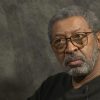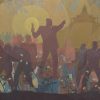
Literature—regardless of how it is delivered, whether in song, sermon, novel, short story, poem or essay—has the unique ability to inform, to uplift, and to shape our opinions and worldviews.
At least that’s how James Basker, the Richard Gilder Professor of Literary History at Barnard College at Columbia University, sees it. It’s a crucial point and question in his new online master’s course Amazing Grace: How Writers Helped End Slavery.
The course, which delves into American anti-slavery writings from the late 1600s to about the mid-1800s, when emancipation was finally granted, looks at how an entire public consciousness could change so completely in a relatively short period of time.
“If you look around in 1600 … you just won’t find anywhere in any developed society where anybody questions unfree labor,” Basker explained to The Root. “And 300 years later, if we jump to 1900, basically most of the world has come to assume that unfree labor is completely wrong and large parts of the world have succeeded in ending it, at least legally. So that’s a huge change in 300 years, which, in the longer sweep of history … is an amazing change.”
The course looks at both black and white writers—from the well-known, such as Benjamin Franklin and Frederick Douglass, to the lesser-known, including Samuel Sewall, a judge at the Salem witch trials, and David Walker, the first advocate of black nationalism—and even explores the anonymous yet equally important writers of love stories, songs and other literature who were opposed to the evils of the slave trade.
“For me the driving question is not just the little benchmarks, not when a law gets passed or a war got fought, but what were the underlying influences that changed people’s attitudes and woke them up morally and emotionally and eventually politically to the evils of slavery. That’s where I think the story gets told in these countless numbers of literary texts, sermons, slave narratives, pieces of fiction, poetry,” the professor said.
It was a project inspired in part by Basker’s own desire to bring these stories and their important historical context to the forefront, especially in a literary world where history is sort of, in his own words, “bleached out.”
“The presence of black experience had been minimized or almost eliminated,” he explained.
Of course, this is not necessarily true in the modern context—not when the Toni Morrisons and Maya Angelous are oft lauded—but as he said of his own literary community, “They weren’t looking at black experiences as … depicted by literature in the 1700s and early 1800s almost at all.”
Another goal of the course is to “get these stories back into the collective public memory and consciousness,” which Basker thinks will “restore a much healthier balance of history.”
The hardest part of developing the course was deciding which of the amazing authors and orators of the day would make the cut. Basker chose some writers who are historically important merely by virtue of being “the first,” but he also included some of the most radical and most outspoken.
The professor—passionately but with an almost childlike wonder—spoke about a few of his favorite picks, such as poet Phillis Wheatley, a prodigious child who was sold into slavery on a dock in Boston, only to become the first published African-American female writer; and Olaudah Equiano, a shrewd sailor who saved up enough money to buy his own freedom and later become a writer who influenced, among others, Frederick Douglass himself. Basker lamented that more movies hadn’t been made about these important figures—along the lines of 12 Years a Slave—and that many of their fascinating stories were fading into obscurity.
This lack of attention and awareness is another reason he hopes that teachers will take an interest in his course and sign up.
“My passion is to try to reach teachers. Teachers are the lifeblood of the system. My dream is that teachers will pick up some of these texts and begin to teach them in middle schools and high schools and just raise the general awareness of every generation of kids to come,” said Basker, who is also president of the Gilder Lehrman Institute of American History, which is the nonprofit organization behind the course.
As to why a course like this, steeped in what some may brush off as ancient history, is so important and relevant to today’s world, the professor explains why it is imperative: in order to ensure that history is not repeated and that societal problems informed by the past are addressed.
“[These] phenomena have consequences. First [the course] helps explain the disadvantaged condition that black people are disproportionately in socioeconomically. It helps us to understand the world we’re in; it helps us to understand the attitudes people have toward this kind of thing,” he ticked off. “It helps us to understand what our priorities should be.
“If we look back and see that for 300 years black people were denied the right to be literate … how can we begrudge the idea that there needs to be extra effort paid to support education and educational opportunities? There are modern policies that have to be based on this historical fact. It’s a moral and political responsibility … It’s profoundly important … To deny that, I think, is crazy,” Basker added.
It also, however, shows the true power of literature and how it can affect a society. He pointed to Solomon Northup’s narrative in 12 Years a Slave—the honest and brutal way he portrayed slavery (and the way it was later retold in the award-winning film)—as a key example of how literature can inform the public and make people aware of the issues of the time.
“[Anti-slavery writers] made their readers face the horrors of what was going on in slavery, made it visible. People don’t want to be confronted with that so much today. I think that’s important,” Basker pointed out. “They have a Jewish saying, ‘Never forget’—well, in order to never forget, you first have to remember.”
Basker also thinks the course is important for students who may not see the creative arts or writing as a worthwhile endeavor, unlike medicine or science.
“[Students] don’t think of literature or creative arts as important forces in the world, but if you look back to the history of the anti-slavery movement, [they are] profoundly important. I think that’s an idea that young people today can carry forward,” the professor said. “Those who tell the stories, those who teach the future generations, those who make the movies or write the novels or children’s books, they are shaping the collective imagination of people in the future. They have tremendous power, if you think about it.”
The online course Amazing Grace: How Writers Helped End Slavery starts on Sept. 15 and can be audited for $25. Participants are also eligible for three master’s degree credits. Registration ends Sept. 9.
Breanna Edwards is a newswriter at The Root. Follow her on Twitter.
















